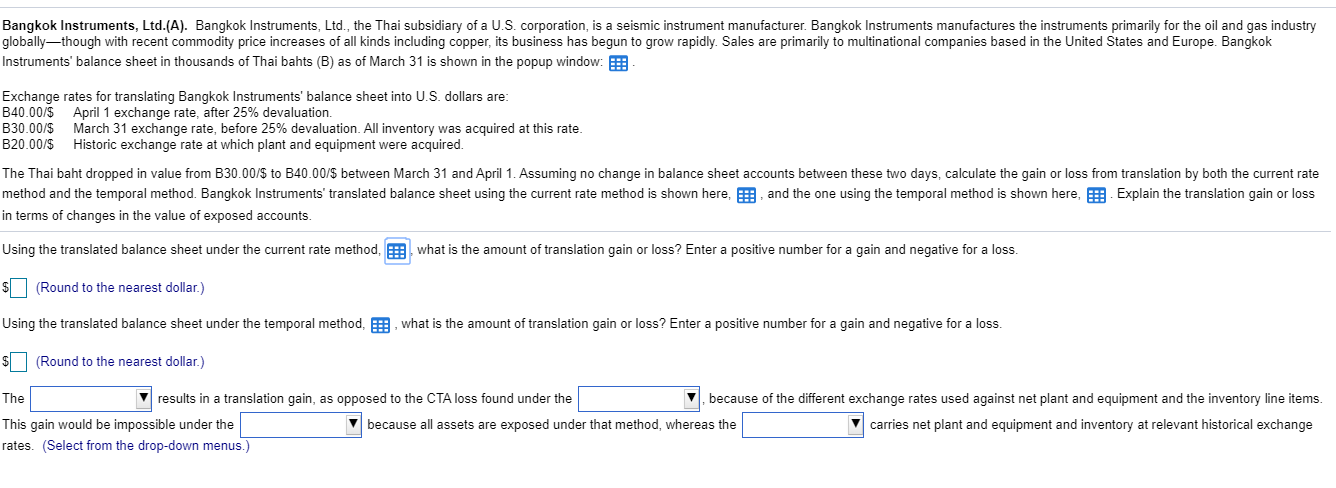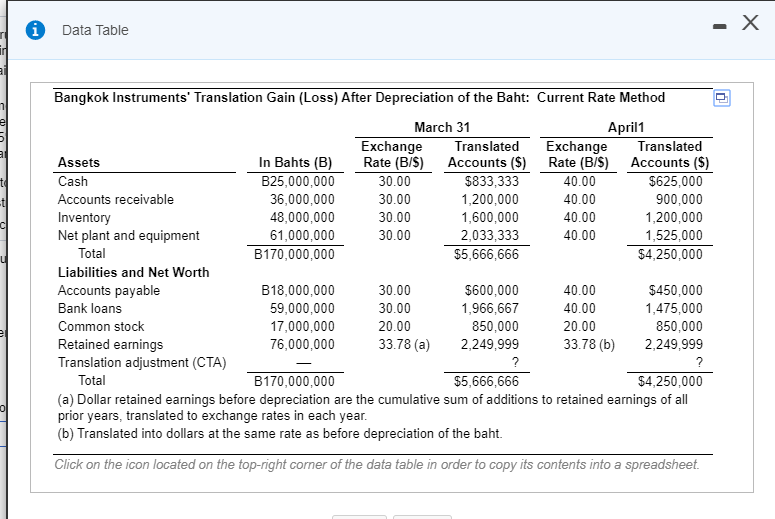

Bangkok Instruments, Ltd.(A). Bangkok Instruments, Ltd., the Thai subsidiary of a U.S. corporation, is a seismic instrument manufacturer. Bangkok Instruments manufactures the instruments primarily for the oil and gas industry globallythough with recent commodity price increases of all kinds including copper, its business has begun to grow rapidly. Sales are primarily to multinational companies based in the United States and Europe. Bangkok Instruments' balance sheet in thousands of Thai bahts (B) as of March 31 is shown in the popup window: PE: Exchange rates for translating Bangkok Instruments' balance sheet into U.S. dollars are: B40.00/$ April 1 exchange rate, after 25% devaluation. B30.00/$ March 31 exchange rate, before 25% devaluation. All inventory was acquired at this rate. B20.00/$ Historic exchange rate at which plant and equipment were acquired. The Thai baht dropped in value from B30.00/$ to B40.00/$ between March 31 and April 1. Assuming no change in balance sheet accounts between these two days, calculate the gain or loss from translation by both the current rate method and the temporal method. Bangkok Instruments' translated balance sheet using the current rate method is shown here, E, and the one using the temporal method is shown here, P . Explain the translation gain or loss in terms of changes in the value of exposed accounts. Using the translated balance sheet under the current rate method, what is the amount of translation gain or loss? Enter a positive number for a gain and negative for a loss. $ (Round to the nearest dollar.) Using the translated balance sheet under the temporal method, what is the amount of translation gain or loss? Enter a positive number for a gain and negative for a loss. $ (Round to the nearest dollar.) The V results in a translation gain, as opposed to the CTA loss found under the y, because of the different exchange rates used against net plant and equipment and the inventory line items. This gain would be impossible under the because all assets are exposed under that method, whereas the carries net plant and equipment and inventory at relevant historical exchange rates. (Select from the drop-down menus.) i Data Table Bangkok Instruments' Translation Gain (Loss) After Depreciation of the Baht: Current Rate Method in + Cash March 31 April 1 Exchange Translated Exchange Translated Assets In Bahts (B) Rate (B/S) Accounts ($) Rate (B/S) Accounts ($) B25,000,000 30.00 $833,333 40.00 $625,000 Accounts receivable 36,000,000 30.00 1,200,000 40.00 900,000 Inventory 48,000,000 30.00 1,600,000 40.00 1,200,000 Net plant and equipment 61,000,000 30.00 2,033,333 40.00 1,525,000 Total B170,000,000 $5,666,666 $4,250,000 Liabilities and Net Worth Accounts payable B18,000,000 30.00 $600,000 40.00 $450,000 Bank loans 59,000,000 30.00 1,966,667 40.00 1,475,000 Common stock 17,000,000 20.00 850,000 20.00 850,000 Retained earnings 76,000,000 33.78 (a) 2,249,999 33.78 (b) 2,249,999 Translation adjustment (CTA) Total B170,000,000 $5,666,666 $4,250,000 (a) Dollar retained earnings before depreciation are the cumulative sum of additions to retained earnings of all prior years, translated to exchange rates in each year. (b) Translated into dollars at the same rate as before depreciation of the baht. Click on the icon located on the top-right corner of the data table in order to copy its contents into a spreadsheet. Bangkok Instruments, Ltd.(A). Bangkok Instruments, Ltd., the Thai subsidiary of a U.S. corporation, is a seismic instrument manufacturer. Bangkok Instruments manufactures the instruments primarily for the oil and gas industry globallythough with recent commodity price increases of all kinds including copper, its business has begun to grow rapidly. Sales are primarily to multinational companies based in the United States and Europe. Bangkok Instruments' balance sheet in thousands of Thai bahts (B) as of March 31 is shown in the popup window: PE: Exchange rates for translating Bangkok Instruments' balance sheet into U.S. dollars are: B40.00/$ April 1 exchange rate, after 25% devaluation. B30.00/$ March 31 exchange rate, before 25% devaluation. All inventory was acquired at this rate. B20.00/$ Historic exchange rate at which plant and equipment were acquired. The Thai baht dropped in value from B30.00/$ to B40.00/$ between March 31 and April 1. Assuming no change in balance sheet accounts between these two days, calculate the gain or loss from translation by both the current rate method and the temporal method. Bangkok Instruments' translated balance sheet using the current rate method is shown here, E, and the one using the temporal method is shown here, P . Explain the translation gain or loss in terms of changes in the value of exposed accounts. Using the translated balance sheet under the current rate method, what is the amount of translation gain or loss? Enter a positive number for a gain and negative for a loss. $ (Round to the nearest dollar.) Using the translated balance sheet under the temporal method, what is the amount of translation gain or loss? Enter a positive number for a gain and negative for a loss. $ (Round to the nearest dollar.) The V results in a translation gain, as opposed to the CTA loss found under the y, because of the different exchange rates used against net plant and equipment and the inventory line items. This gain would be impossible under the because all assets are exposed under that method, whereas the carries net plant and equipment and inventory at relevant historical exchange rates. (Select from the drop-down menus.) i Data Table Bangkok Instruments' Translation Gain (Loss) After Depreciation of the Baht: Current Rate Method in + Cash March 31 April 1 Exchange Translated Exchange Translated Assets In Bahts (B) Rate (B/S) Accounts ($) Rate (B/S) Accounts ($) B25,000,000 30.00 $833,333 40.00 $625,000 Accounts receivable 36,000,000 30.00 1,200,000 40.00 900,000 Inventory 48,000,000 30.00 1,600,000 40.00 1,200,000 Net plant and equipment 61,000,000 30.00 2,033,333 40.00 1,525,000 Total B170,000,000 $5,666,666 $4,250,000 Liabilities and Net Worth Accounts payable B18,000,000 30.00 $600,000 40.00 $450,000 Bank loans 59,000,000 30.00 1,966,667 40.00 1,475,000 Common stock 17,000,000 20.00 850,000 20.00 850,000 Retained earnings 76,000,000 33.78 (a) 2,249,999 33.78 (b) 2,249,999 Translation adjustment (CTA) Total B170,000,000 $5,666,666 $4,250,000 (a) Dollar retained earnings before depreciation are the cumulative sum of additions to retained earnings of all prior years, translated to exchange rates in each year. (b) Translated into dollars at the same rate as before depreciation of the baht. Click on the icon located on the top-right corner of the data table in order to copy its contents into a spreadsheet








